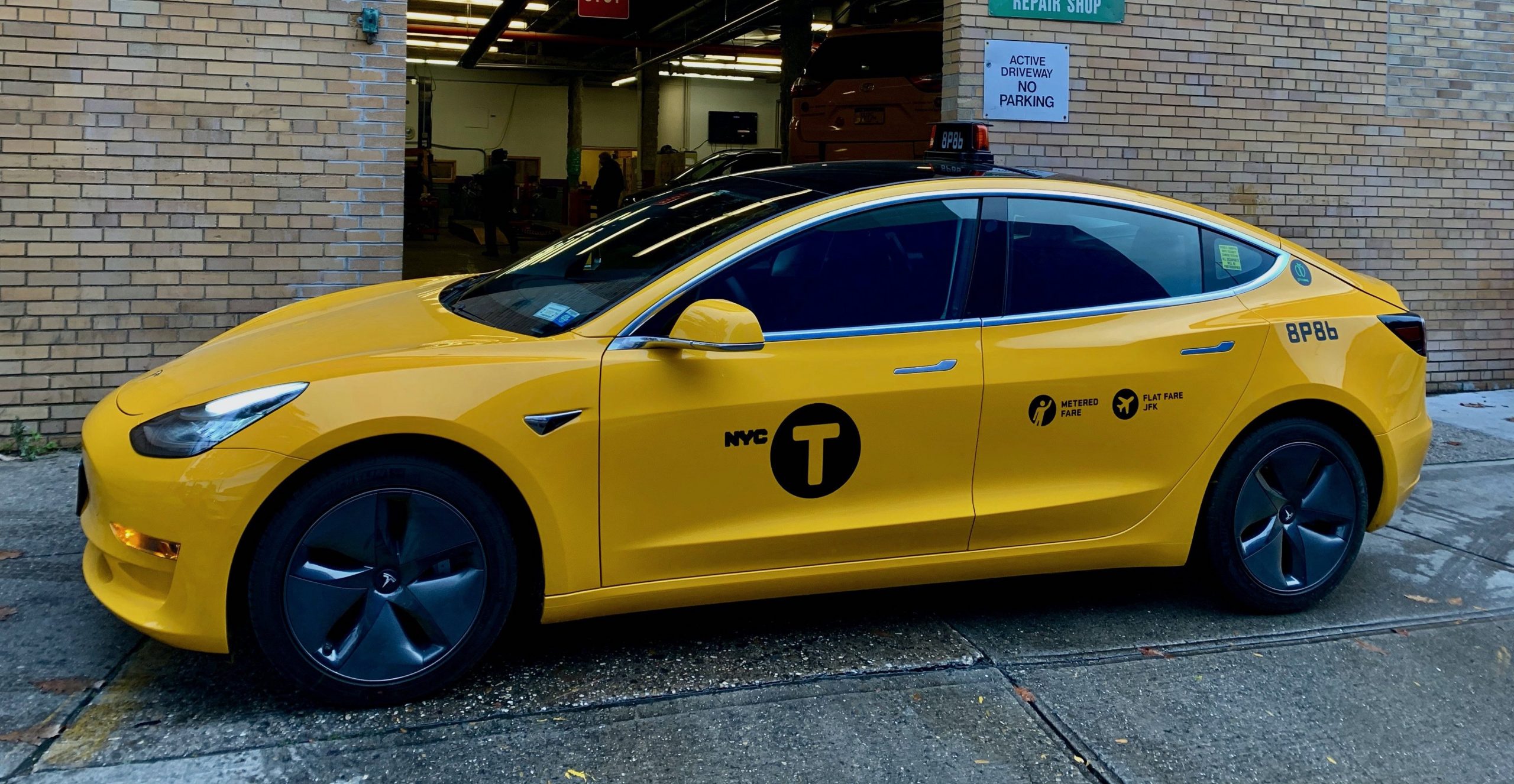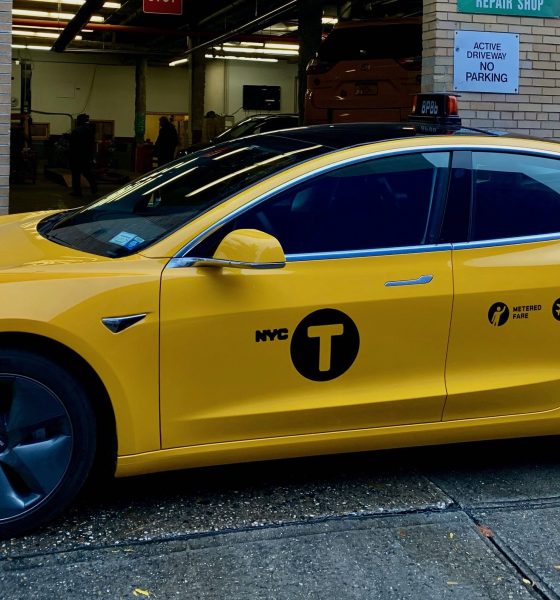

News
Tesla Model 3 wins hearts as famed NYC Taxi, picks up where Nissan Leaf couldn’t
Images of a Tesla Model 3 being used as a New York City taxi cab, complete with the fleet’s iconic yellow paint scheme, have started making the rounds online. The vehicle, which was sighted in Manhattan near a Tesla store, signifies what could very well be an upcoming shift towards sustainability for NYC’s taxi fleet. It also symbolizes a second chance of sorts for all-electric vehicles, especially considering the failure of the Nissan Leaf taxis in previous years.
Back in 2013, New York City launched a pilot program for all-electric taxis with a fleet of six first-gen Nissan Leafs. The vehicles were let loose in the city on Earth Day to much optimism and acclaim, but by 2015, the Leafs were decommissioned. In its final report, the NYC Taxi & Limousine Commission noted that the Nissan Leaf required drivers to significantly alter their driving habits due to the vehicles’ EPA-estimated 84-mile range. This handicap was highlighted further when the weather was hot, since the use of air conditioners was required for NYC taxis.
First Model 3 Taxi in NYC from r/teslamotors
The failure of the Leaf as a New York taxi was a cloud above all-electric cars until 2019, when reports emerged stating that the Tesla Model 3 had been approved for taxi service in the city. The all-electric sedan more than meets the minimum requirements for NYC cabs. These requirements include ample interior space, air conditioning for rear-seat passengers, seats that are easy to clean, and enough cabin space to install the clear partition that separates the driver from passengers in the backseat.
More importantly, the Model 3 does not have the same weakness as the first-gen Leafs from 2013. Unlike the 84-mile Leaf, the shortest-range Model 3 boasts at least 220 miles per charge, and that’s if customers specifically request for the non-Autopilot Standard Range version. Otherwise, the Standard Range Plus, the more affordable variant that could be ordered directly on Tesla’s website, offers an EPA-estimated range of 263 miles for $37,990. Autopilot also comes as a standard feature on variants from the Standard Range Plus and above.
Considering the power and range of the Tesla Model 3, there seems to be a good chance that the vehicle will not have the same feedback from taxi drivers as the first-gen Leafs from 2013. The Model 3, if any, would likely outperform the city’s other, conventional taxis, and its fast-charging capabilities through Tesla’s Supercharger Network would allow the vehicle to replenish most of its range while drivers take a brief break. The vehicle’s sizable cargo space from its trunk and frunk would likely be appreciated by commuters as well.
New York’s Tesla Model 3 taxi drivers would best be advised to take it easy on the all-electric sedan’s accelerator, however. Electric cars are famed for their instant torque, and the Model 3 is no exception, with even the Standard Range Plus variant having a 0-60 mph time that rivals muscle cars. If NYC taxi drivers develop a habit of punching the Model 3’s accelerator at every chance, history might end up repeating itself innumerable times. The first speeding infraction ever committed in the United States back in 1899, after all, was from a New York City cabbie who was driving 12 mph down Lexington Street in Manhattan, 4 mph above the legal speed limit at the time.
The NYC taxi driver, Jacob German, was driving a battery-electric car.

Cybertruck
Tesla drops latest hint that new Cybertruck trim is selling like hotcakes
According to Tesla’s Online Design Studio, the new All-Wheel-Drive Cybertruck will now be delivered in April 2027. Earlier orders are still slated for early this Summer, but orders from here on forward are now officially pushed into next year:

Tesla’s new Cybertruck offering has had its delivery date pushed back once again. This is now the second time, and deliveries for the newest orders are now pushed well into 2027.
According to Tesla’s Online Design Studio, the new All-Wheel-Drive Cybertruck will now be delivered in April 2027. Earlier orders are still slated for early this Summer, but orders from here on forward are now officially pushed into next year:
🚨 Tesla has updated the $59,990 Cybertruck Dual Motor AWD’s estimated delivery date to April 2027.
First deliveries are still slated for June, but if you order it now, you’ll be waiting over a year.
Demand appears to be off the charts for the new Cybertruck and consumers are… pic.twitter.com/raDCCeC0zP
— TESLARATI (@Teslarati) February 26, 2026
Just three days ago, the initial delivery date of June 2026 was pushed back to early Fall, and now, that date has officially moved to April 2027.
The fact that Tesla has had to push back deliveries once again proves one of two things: either Tesla has slow production plans for the new Cybertruck trim, or demand is off the charts.
Judging by how Tesla is already planning to raise the price based on demand in just a few days, it seems like the company knows it is giving a tremendous deal on this spec of Cybertruck, and units are moving quickly.
That points more toward demand and not necessarily to slower production plans, but it is not confirmed.
Tesla Cybertruck’s newest trim will undergo massive change in ten days, Musk says
Tesla is set to hike the price on March 1, so tomorrow will be the final day to grab the new Cybertruck trim for just $59,990.
It features:
- Dual Motor AWD w/ est. 325 mi of range
- Powered tonneau cover
- Bed outlets (2x 120V + 1x 240V) & Powershare capability
- Coil springs w/ adaptive damping
- Heated first-row seats w/ textile material that is easy to clean
- Steer-by-wire & Four Wheel Steering
- 6’ x 4’ composite bed
- Towing capacity of up to 7,500 lbs
- Powered frunk
Interestingly, the price offering is fairly close to what Tesla unveiled back in late 2019.
Elon Musk
Elon Musk outlines plan for first Starship tower catch attempt
Musk confirmed that Starship V3 Ship 1 (SN1) is headed for ground tests and expressed strong confidence in the updated vehicle design.

Elon Musk has clarified when SpaceX will first attempt to catch Starship’s upper stage with its launch tower. The CEO’s update provides the clearest teaser yet for the spacecraft’s recovery roadmap.
Musk shared the details in recent posts on X. In his initial post, Musk confirmed that Starship V3 Ship 1 (SN1) is headed for ground tests and expressed strong confidence in the updated vehicle design.
“Starship V3 SN1 headed for ground tests. I am highly confident that the V3 design will achieve full reusability,” Musk wrote.
In a follow-up post, Musk addressed when SpaceX would attempt to catch the upper stage using the launch tower’s robotic arms.
“Should note that SpaceX will only try to catch the ship with the tower after two perfect soft landings in the ocean. The risk of the ship breaking up over land needs to be very low,” Musk clarified.
His remarks suggest that SpaceX is deliberately reducing risk before attempting a tower catch of Starship’s upper stage. Such a milestone would mark a major step towards the full reuse of the Starship system.
SpaceX is currently targeting the first Starship V3 flight of 2026 this coming March. The spacecraft’s V3 iteration is widely viewed as a key milestone in SpaceX’s long-term strategy to make Starship fully reusable.
Starship V3 features a number of key upgrades over its previous iterations. The vehicle is equipped with SpaceX’s Raptor V3 engines, which are designed to deliver significantly higher thrust than earlier versions while reducing cost and weight.
The V3 design is also expected to be optimized for manufacturability, a critical step if SpaceX intends to scale the spacecraft’s production toward frequent launches for Starlink, lunar missions, and eventually Mars.
News
Tesla FSD (Supervised) could be approved in the Netherlands next month: Musk
Musk shared the update during a recent interview at Giga Berlin.

Tesla CEO Elon Musk shared that Full Self-Driving (FSD) could receive regulatory approval in the Netherlands as soon as March 20, potentially marking a major step forward for Tesla’s advanced driver-assistance rollout in Europe.
Musk shared the update during a recent interview at Giga Berlin, noting that the date was provided by local authorities.
“Tesla has the most advanced real-world AI, and hopefully, it will be approved soon in Europe. We’re told by the authorities that March 20th, it’ll be approved in the Netherlands,’ what I was told,” Musk stated.
“Hopefully, that date remains the same. But I think people in Europe are going to be pretty blown away by how good the Tesla car AI is in being able to drive.”
Tesla’s FSD system relies on vision-based neural networks trained on real-world driving data, allowing vehicles to navigate using cameras and AI rather than traditional sensor-heavy solutions.
The performance of FSD Supervised has so far been impressive. As per Tesla’s safety report, Full Self-Driving Supervised has already traveled 8.3 billion miles. So far, vehicles operating with FSD Supervised engaged recorded one major collision every 5,300,676 miles.
In comparison, Teslas driven manually with Active Safety systems recorded one major collision every 2,175,763 miles, while Teslas driven manually without Active Safety recorded one major collision every 855,132 miles. The U.S. average during the same period was one major collision every 660,164 miles.
If approval is granted on March 20, the Netherlands could become the first European market to greenlight Tesla’s latest supervised FSD (Supervised) software under updated regulatory frameworks. Tesla has been working to secure expanded FSD access across Europe, where regulatory standards differ significantly from those in the United States. Approval in the Netherlands would likely serve as a foundation for broader EU adoption, though additional country-level clearances may still be required.








